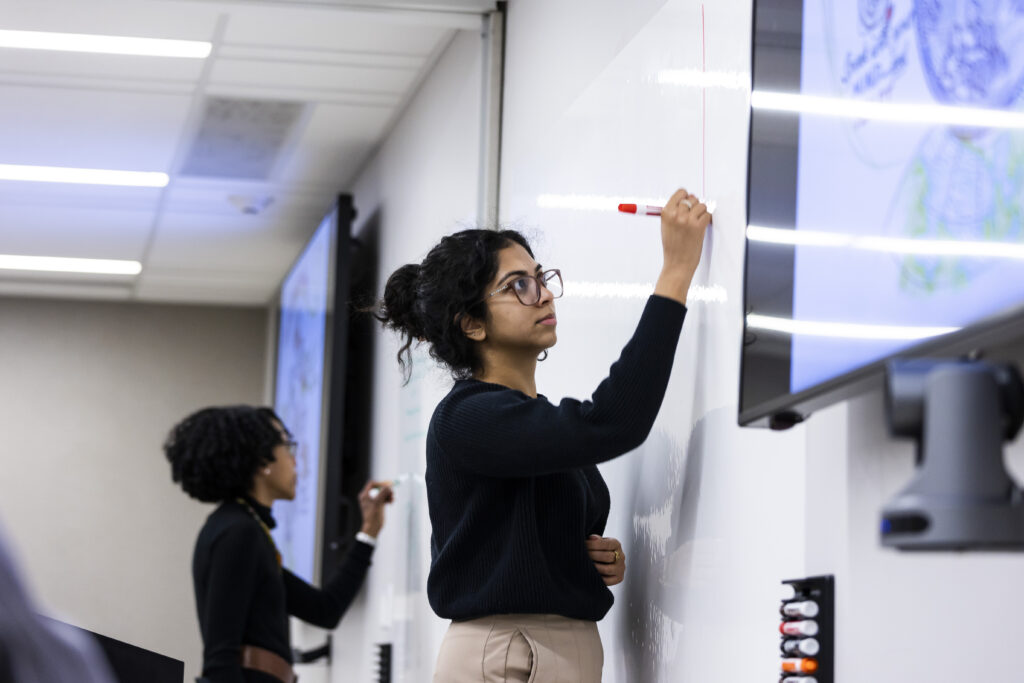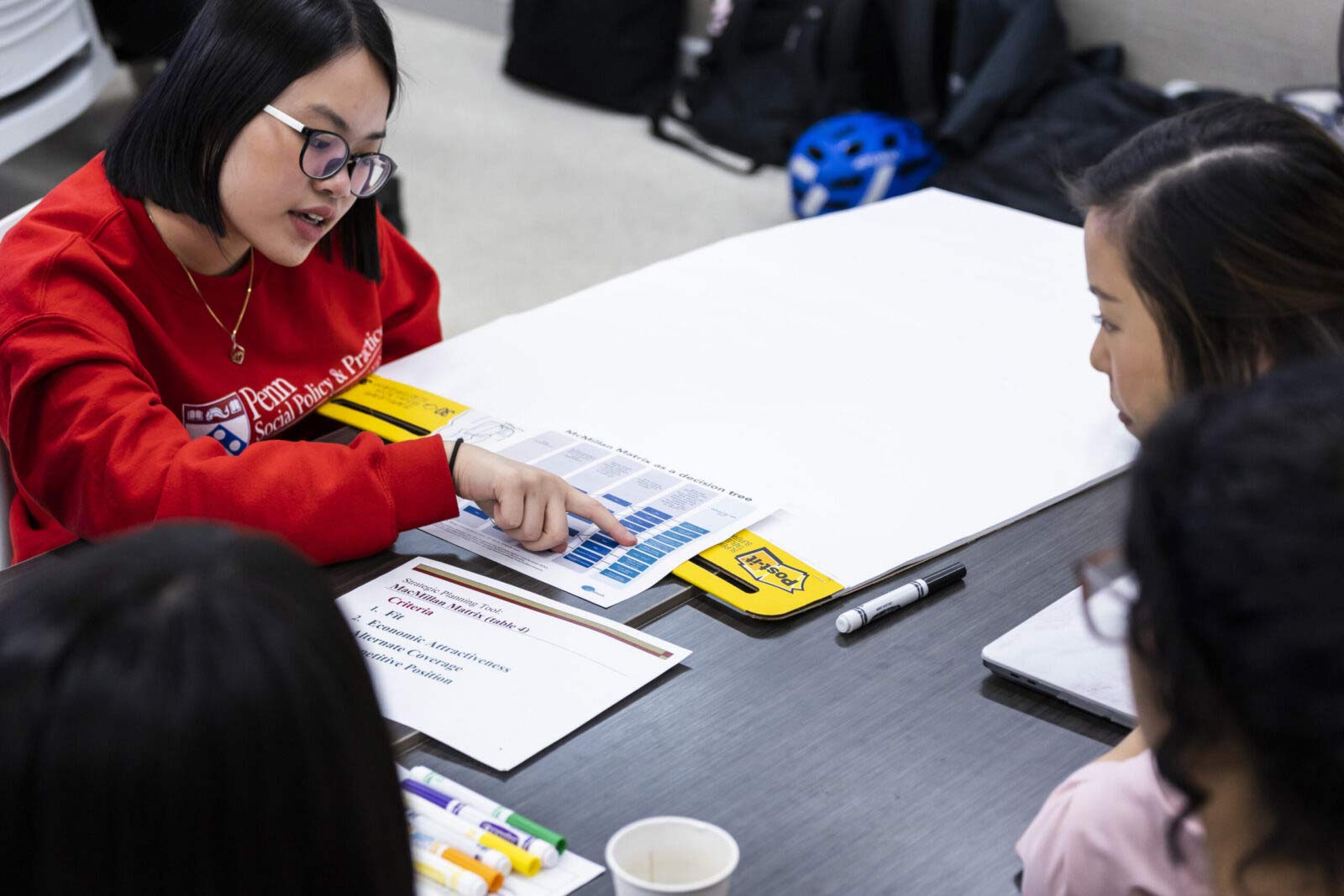
MASTER OF SCIENCE INNONPROFIT LEADERSHIP
Lead visionary organizations working to make meaningful change every day.
The Master of Science in Nonprofit Leadership (NPL) Program prepares nonprofit leaders and social entrepreneurs to guide organizations tackling some of the world’s most complex social challenges. Learn to create social impact through thoughtful, inventive, and meaningful work in nonprofits, charitable foundations, international NGOs, and more. This program is ideal for existing nonprofit professionals, those looking to launch their careers, or career changers from other sectors.
Request Info
Learn more about the NPL program and the SP2 experience.
Apply Now
Ready to experience SP2? Learn more about the application process.
Visit SP2
Join us for an upcoming in-person or virtual event.
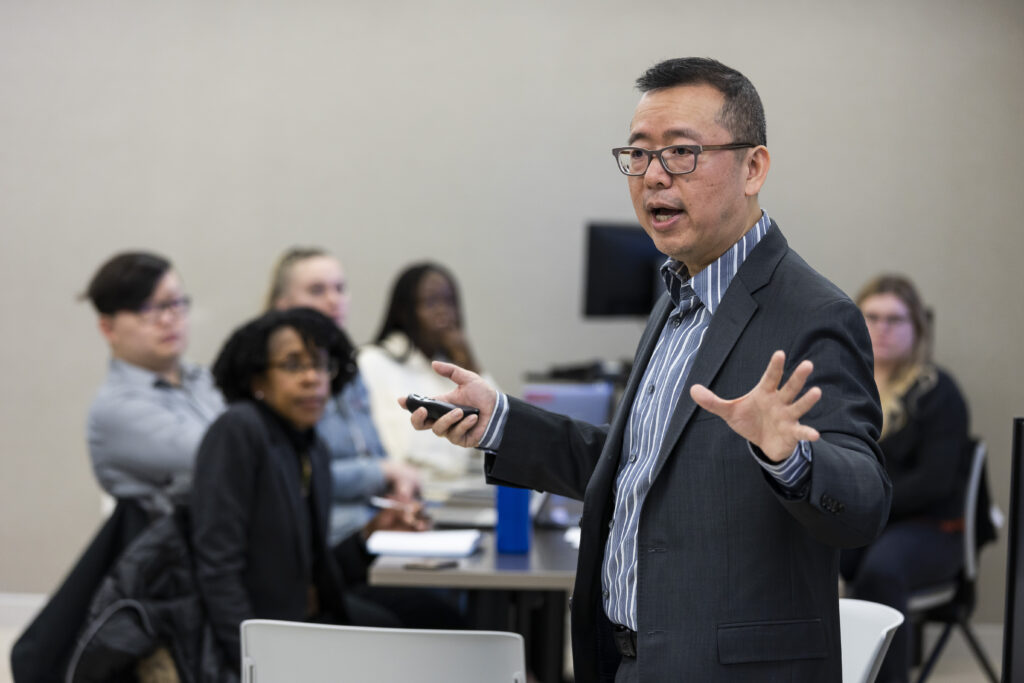
World-Class Faculty
Our faculty are expert educators, researchers, and practitioners, drawing on decades of experience in areas such as philanthropy, the role and effects of new media on nonprofit organizations, ethical dilemmas that arise in nonprofits, and management and leadership challenges in social enterprises.
The SP2 NPL Difference
Flexible completion options—full-time (10 months) or part-time (2.5 years), on-campus or online—mean you can keep working while enrolled
Hands-on, career-focused experience through a Leadership Practicum with a host organization or executive-level leader
Program can be tailored to your interests through interdisciplinary electives throughout Penn
INVISIBLE – leave blank
Small classes led by world-class faculty
A diverse global alumni network
On-Campus Full Time
The on-campus full time NPL program encompasses two to three semesters of coursework and a nonprofit placement for professional development (the Leadership Practicum). You’ll take five graduate level course units (CUs) in both the fall and spring semesters for a total of 10 CUs, including at least four NPLD core CUs and up to two Penn elective courses. Alternatively, you may lower your Fall and/or Spring courseload and take up to 2 CUs in the Summer semester. Students can also take courses offered through the online program.
Most courses meet once a week on a weekday for three hours. Other courses may be offered in one-week or weekend intensive sessions.
The minimum course load for students is one CU, and the maximum is five CUs per fall or spring semester, or two CUs in the summer semester.
A number of NPLD courses are half CUs, and two are required to meet the one CU requirement.
The program also includes a required on-campus orientation and cohort building in late August, and graduates are encouraged to participate in Commencement in May.
The following schedule is an example of how students may plan their courses.
Fall Semester
- 2 NPLD core CUs; and
- 1 or 2 NPLD electives CUs; and
- 1 Penn elective CU for a total of 4 or 5 CUs.
Spring Semester
- 2 NPLD core CUs; and
- 1 or 2 NPLD elective CUs; and
- 1 Penn elective CU for a total of 4 or 5 CUs.
Summer Semester
- Up to 2 CUs may be taken over the summer as part of the full-time program.
On-Campus Part Time
In the on-campus part time NPL Program, most students take two course units (CUs) each semester for five semesters for a total of 10 CUs over 2.5 academic years, in addition to completing a mentorship with a nonprofit leader (the Leadership Practicum). Your 10 CUs will include at least four NPLD core CUs and up to two Penn elective courses. You can complete the program in as little as four semesters, taking two and a half CUs each semester, or as long as three academic years. Students can also take courses offered through the online program.
Part time students must adhere to all program requirements on a part time basis.
Most courses meet once a week on a weekday for three hours. Other courses may be offered in one-week or weekend intensive sessions.
The minimum course load for students is one CU per semester, and the maximum to maintain part-time status is two and a half CUs per fall or spring semester, or 2 CUs in the summer semester.
Although completion is recommended within three years, students must complete the degree within five years of the date when the student first registered for the degree.
With approval from their advisor, students can complete the requirements at an accelerated pace. This typically includes taking two or more CUs over the summer.
A number of NPLD courses are half CUs, and two are required to meet the one CU requirement.
The program also includes a required on-campus orientation and cohort building in late August, and graduates are encouraged to participate in Commencement in May.
The following schedule is an example of how students may plan their courses.
Year One
Fall Semester
- 2 NPLD core CU for a total of 2 CUs.
Spring Semester
- 1 or 2 NPLD core CUs; and/or
- 1 NPLD elective CU for a total of 2 CUs.
1st Summer
Up to two CUs may be taken over the summer.
Year Two
Fall Semester
- 1 NPLD core CU; and
- 0.5 or 1 NPLD elective CU; and/or
- 1 Penn elective CU for a total of 2 or 2.5 CUs.
Spring Semester
- 1 NPLD core CU; and
- 0.5 or 1 NPLD electives CU; or
- 1 Penn elective CU for a total of 2 or 2.5 CUs.
2nd Summer
Up to two CUs may be taken over the summer.
Year Three
Fall Semester
Any remaining NPLD CUs not taken or Penn elective CU.
Online Full Time
The online full-time NPL program encompasses two to three semesters of coursework and a nonprofit placement for professional development (the Leadership Practicum). You’ll take five graduate level course units (CUs) in both the fall and spring semesters for a total of 10 CUs, including at least four NPLD core CUs and up to two Penn elective courses. Alternatively, you may lower your fall and/or spring courseload and take up to 2 CUs in the summer semester. Students can also take courses offered in the on-campus program.
Courses are a mix of live and recorded content with most live sessions meeting online once a week on a weekday evening Eastern Time for an hour and a half.
A number of NPLD courses are half CUs, and two are required to meet the one CU requirement.
The program also includes a required online orientation in early August, an optional on-campus orientation and cohort building in late August, and graduates are encouraged to participate in Commencement in May.
The following schedule is an example of how students may plan their courses.
Fall Semester
- 2 NPLD core CUs; and
- 1 or 2 NPLD electives CUs; and
- 1 Penn elective CU for a total of 4 or 5 CUs.
Spring Semester
- 2 NPLD core CUs; and
- 1 or 2 NPLD elective CUs; and
- 1 Penn elective CU for a total of 4 or 5 CUs.
Summer Semester
- Up to 2 CUs may be taken over the summer as part of the full-time program.
Online Part Time
In the online part time NPL Program, most students take two course units (CUs) each semester for five semesters for a total of 10 CUs over 2.5 academic years, in addition to completing a nonprofit leader (the Leadership Practicum). You can complete the program in as little as four semesters, taking two and a half CUs each semester, or as long as three academic years. Students can also take courses in the on-campus program.
Part time students must adhere to all program requirements on a part time basis.
The minimum course load for students is one CU per semester and the maximum to maintain part-time status is two and a half CUs per fall or spring semester, or 2 CUs in the summer semester.
Although completion is recommended within three years, students must complete the degree within five years of the date when the student first registered for the degree.
With approval from their advisor, students can complete the requirements at an accelerated pace. This typically includes taking two or more CUs over the summer.
Courses are a mix of live and recorded content with most live sessions meeting once a week.
A number of NPLD courses are half CUs, and two are required to meet the one CU requirement.
The program also includes a required online orientation in early August, an optional on-campus orientation and cohort building in late August, and graduates are encouraged to participate in Commencement in May.
The following schedule is an example of how students may plan their courses.
Year One
Fall Semester
- 2 NPLD core CU for a total of 2 CUs.
Spring Semester
- 1 or 2 NPLD core CUs; and/or
- 1 NPLD elective CU for a total of 2 CUs.
1st Summer
Up to two CUs may be taken over the summer.
Year Two
Fall Semester
- 1 NPLD core CU; and
- 0.5 or 1 NPLD elective CU; and/or
- 1 Penn elective CU for a total of 2 or 2.5 CUs.
Spring Semester
- 1 NPLD core CU; and
- 0.5 or 1 NPLD electives CU; and/or
- 1 Penn elective CU for a total of 2 or 2.5 CUs.
2nd Summer
Up to two CUs may be taken over the summer.
Year Three
Fall Semester
Any remaining NPLD CUs not taken or Penn elective CU.
Dual Degree Options
Dual degree options are only available to students enrolled in the on-campus program.
Leadership Practicum
The Leadership Practicum enhances your understanding of leadership in nonprofits and social enterprises and fosters a commitment by nonprofit leaders to cultivate the next generation of transformative leaders. You’ll witness leadership in action and benefit from individual mentoring and leadership development.
Ready to join the NPL community?
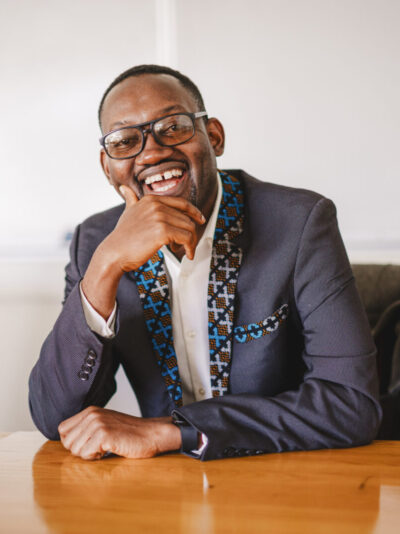
FEATURED ALUMNI
Kimmie Weeks
“What I appreciated most about my experience at SP2 was the sense of community. Even though we were part of a large university, SP2 felt like a small and close-knit environment. Our classes were small, and the professors genuinely cared about our growth both academically and personally.
I also really valued the depth of real-world experience that each professor brought. Many had spent years working in the nonprofit sector, which made the learning meaningful and grounded in reality. The entire curriculum felt intentionally designed to be practical and relevant, with a clear focus on preparing us to make a real impact in the world.”
The Master of Science in Nonprofit Leadership (NPL) Program is offered by the University of Pennsylvania, an institution of higher education authorized to confer degrees and certificates conferring academic credit under applicable laws of the United States. Students who are interested in participating in the program from countries other than the United States are advised that each jurisdiction may have its own laws and regulations governing online educational programs, and some jurisdictions may not recognize course credit or an online degree awarded by the University as satisfying local requirements for professional licensure, employment qualification, or other purposes. Before enrolling in this program, prospective students should investigate their jurisdiction’s treatment of foreign online programs to ensure that participation in this program will meet their objectives.
Related News
Faculty & Research
12/02

Reimagining philanthropy and supporting everyday givers
This GivingTuesday, Kat Rosqueta shares ways that anyone can get involved in philanthropy and how the Center for High Impact Philanthropy supports givers at all levels.
Student Life
08/26
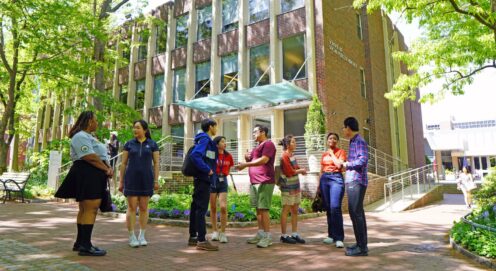
Penn’s School of Social Policy & Practice launches nation’s first practice doctorate in nonprofit administration
Penn’s School of Social Policy & Practice (SP2) is proud to announce the launch of the Doctorate in Nonprofit Administration (DNPA), the first practice-based doctoral program in the nation focused exclusively on leadership for nonprofit administrators.
Student Life
06/05
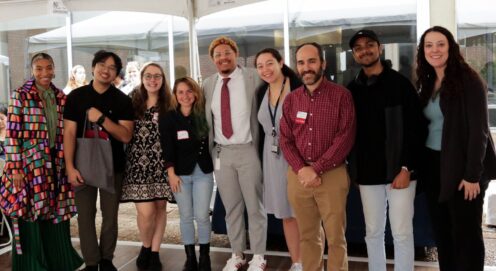
SP2 master’s programs celebrate partnerships & student impact
On Thursday, May 15, Penn’s School of Social Policy & Practice (SP2) hosted its second annual Celebrating Partnerships and Student Impact event. The event brought together SP2 master’s programs and their community partners from Greater Philadelphia area schools, faith-based organizations, charitable foundations, and more.
Contact Us


